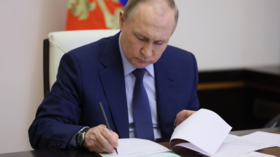Putin signs media discrimination tit-for-tat law

President Vladimir Putin signed a bill into law on Thursday making countries that restrict or ban Russian media subject to retaliation.
According to the law, “if a ban (restriction) is imposed on the activity of a Russian media outlet within the territory of a foreign state,” the prosecutor general and deputies may apply similar measures to that country’s media outlets operating in Russia, resulting in “the termination of the correspondents’ accreditation,” revoking of registration or licenses, and the closure of offices.
The ban could be lifted “only after the elimination of the circumstances which served as the basis for its adoption,” the document states.
The new law also allows the prosecutor general and deputies to withdraw the registration or terminate the broadcasting license of any media outlet in certain circumstances.
These include the distribution of false information, discrediting the activities of Russia’s armed forces, as well as demonstrating clear disrespect “for society, the state, and the official symbols of the Russian Federation.”
Dissemination of “information containing calls for the organization and (or) participation in unauthorized public events,” as well as calls to impose sanctions on Russia and its citizens, could also lead to suspension and potentially a ban.
Previously, only courts had the power to withdraw media registration or revoke licenses.
In case of a first violation, the prosecutor general or deputy would submit a request to the media regulator, Roskomnadzor, to suspend the activities of the media outlet for up to three months. In the event of a repeat violation, a similar order could be issued for six months. With repeated distribution of false information, the outlet’s registration would be revoked.
According to the bill, Roskomnadzor can lift the restriction if the media outlet rectifies the matter within a specified timeframe. The legislation comes in response to what Foreign Ministry spokeswoman Maria Zakharova described as “mediacide based on ethnicity and political beliefs.”
Russia’s military operation in Ukraine, which was launched in late February, has further strained relations between Moscow and the West. In response to the operation, Western countries introduced bans and restrictions on certain media outlets. As a result, RT and Sputnik – and even their accounts on some social media platforms – were made inaccessible in the EU. Australia, Canada, and the UK followed suit.
Russia retaliated by blocking the websites of several Western state-run outlets, including the BBC and Deutsche Welle.













